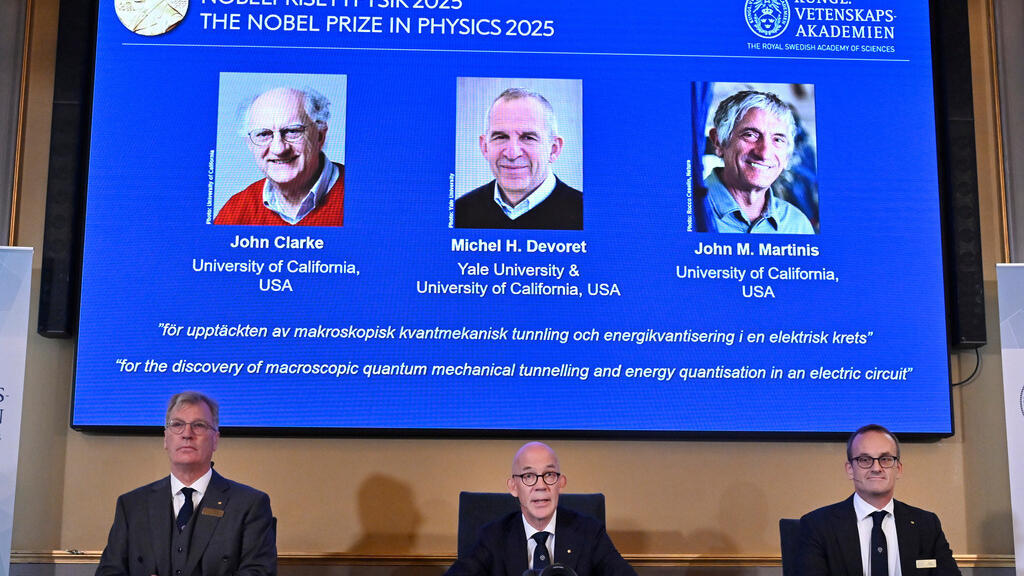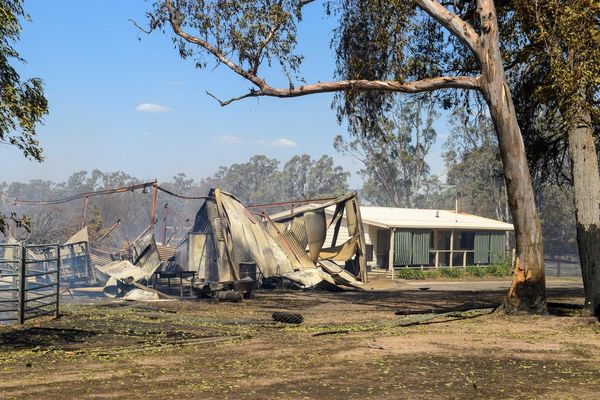
Frenchman Michel H Devoret as well as his longtime American collaborator John M Martinis and the Briton John Clarke were on Tuesday awarded the 2025 Nobel Prize in Physics for their work on quantum physics in action.
The trio, who all carry out their research at American universities, were honoured "for the discovery of macroscopic quantum mechanical tunnelling and energy quantisation in an electric circuit," the Nobel jury said.
Quantum mechanics describes how differently things work on incredibly small scales.
For example, when a normal ball hits a wall, it bounces back. But in the quantum world, a particle will pass straight through that same wall - a phenomenon called "tunnelling".
The 2025 prize was awarded for experiments in the 1980s which showed that quantum tunnelling can also be observed on a macroscopic scale - involving multiple particles - by using superconductors.
In a series of experiments, the researchers demonstrated that "the bizarre properties of the quantum world can be made concrete in a system big enough to be held in the hand," the Royal Swedish Academy of Sciences said in a statement.
The jury noted that the discoveries had provided opportunities for developing the next generation of quantum technology, including quantum cryptography, quantum computers, and quantum sensors.
Olle Eriksson, chair of the Nobel Committee for Physics, said: "It is wonderful to be able to celebrate the way that century-old quantum mechanics continually offers new surprises.
"It is also enormously useful, as quantum mechanics is the foundation of all digital technology."
French Scientist Serge Haroche and American David Wineland share Nobel Physics Prize
French achievement
Devoret, 72, a professor at University of California, Santa Barbara with 67-year-old Martinis, becomes the 18th French scientist to win the prize for physics since its inception in 1901.
He graduated from Télécom Paris engineering college in 1975 and continued his studies at the University of Orsay where he obtained a postgraduate diploma in quantum optics. A doctorate in condensed matter physics followed.
During a study fellowship at Berkeley in the United States between 1982 and 1984, he measured the macroscopic quantum levels of a Josephson junction for the first time with Martinis, then a PhD student.
Nobel Prize in Physics awarded to two climate experts and Italian theorist
Invention at home
On his return to France, Devoret founded the Quantronique group at the Orme des Merisiers laboratory with Daniel Estève and Cristian Urbina.
For the invention with Estève of the electron pump, they were awarded the 1991 Ampere Prize from the French Academy of Science.
Nearly 30 years after working with Martinis, he and the American as well as Robert Schoelkopf won the Fritz London Memorial Prize for pioneering experimental advances in quantum control, quantum information processing and quantum optics.
Quantum of solace: Frenchman in Nobel Physics Prize winning trio
'Never occurred to me'
Clarke, a professor at the University of California, Berkeley, said: "To put it mildly, it was the surprise of my life.
"It never occurred to me in any way that this might be the basis of a Nobel Prize," Clarke added.
The 83-year-old said that the scientists were focused on the physics of their experiments and that they did not realise the practical applications that could follow.
"It certainly had not occurred to us in any way that this discovery would have such a significant impact," he added.
Last year, the Nobel Prize in Physics went to the British-Canadian Geoffrey Hinton and the American John Hopfield for their pioneering work on the foundations of artificial intelligence.
The physics prize will be followed by the chemistry prize on Wednesday.
On Thursday, the literature prize will be announced and the Nobel Peace Prize on Friday. The economics prize wraps up the 2024 Nobel season on October 14.
The winners will receive their award - consisting of a diploma, a gold medal and a $1 million cheque - from Sweden's King Carl XVI Gustaf at a ceremony in Stockholm on 10 December.
(With newswires)







